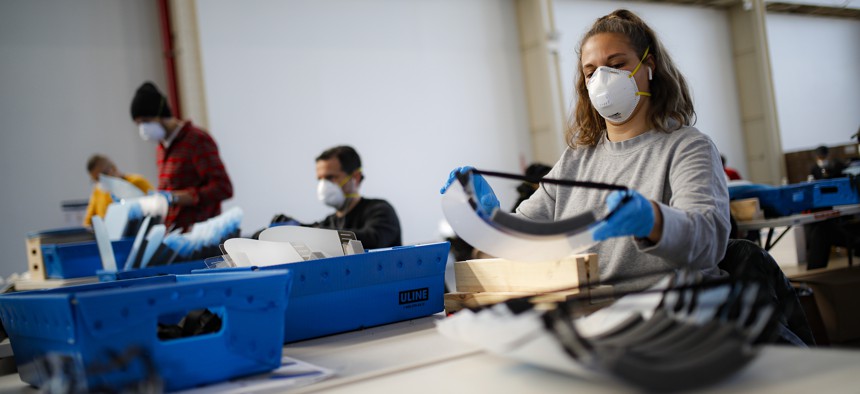State Web Portals Try to Connect New PPE Producers with Desperate Health Care Providers

A worker wearing personal protective equipment builds a splash guard during a mass manufacturing operation to supply New York City government with protection to distribute against COVID-19 transmission, March 27, 2020, at the Brooklyn Navy Yard. AP Photo/John Minchillo

Connecting state and local government leaders
Online portals are connecting hospitals short on personal protective equipment with local businesses making the items.
Businesses across the country have switched gears away from the production of their usual wares to manufacturing personal protective equipment in high demand during the coronavirus pandemic.
But with equipment shortages and so many new vendors entering the marketplace, doctors’ offices, hospitals, and other businesses looking for the supplies may not know where to turn. So, states have launched online portals to help match would-be customers with manufacturers that can meet their needs.
In Pennsylvania, the Department of Community and Economic Development launched a business-to-business directory last week that provides contact information for local manufacturers of a variety of N95 respirator masks and cloth masks, as well as thermometers. To compile the directory, the state put out a call for manufacturers or suppliers of in-demand PPE through two web portals.
“Through this process, we recognized that we can help foster direct business connections to provide Pennsylvanians access to critical supplies expeditiously without a middleman,” said Dennis Davin, secretary of the economic development agency.
The first portal launched in March and sought information from manufacturers and suppliers about equipment that the state could purchase for medical providers, emergency responders, and health care professionals. Through the second portal, the Pennsylvania Manufacturing Call to Action Portal, companies could report their own supply chain capabilities, needs, or workforce gaps.
The nation’s economy has slowed down dramatically as states ordered residents to stay at home and non-essential businesses to close to help stop the spread of the virus. To both keep workers employed and to meet the staggering demands for masks and other equipment needed by health care providers, businesses across the country have begun repurposing their equipment and supplies to manufacture personal protective equipment.
Distilleries have swapped whiskey for hand sanitizer. A company that makes wallets and outdoor gear from recycled sailcloth is now manufacturing face shields. And a 3-D printing business is now churning out thousands of nasal test swabs.
But it’s made for a confusing marketplace, said Chuck Spangler, director of the South Carolina Manufacturing Extension Partnership, one of several partners helping to run an online PPE supply portal in the state.
The launch of the South Carolina Covid-19 Emergency Supply Collaborative has made it much easier to track the current needs of hospitals and other medical providers and to funnel business back into local economies, Spangler said.
“We needed to know the demand from the health care providers so we could be more effective,” he said.
The collaborative, which has partnered with the state’s Department of Commerce, the South Carolina Hospital Association, and the South Carolina Life Sciences Industry, regularly updates the list of critical needs items on its website. When medical providers reach out to the collaborative to discuss their supply needs, the collaborative responds with a list of manufacturers or suppliers they have vetted to ensure they are properly licensed.
About 70% of the 172 of the manufacturers or suppliers currently working with the collaborative are located in South Carolina, which means the effort has been able to channel business back into the state’s economy while also meeting its healthcare needs, Spangler said.
As a result, some businesses have been able to limit the number of employees laid off during the economic crisis while others are even growing. Spangler said. One 3-D printing company that went from producing 30,000 face shields a day to 200,000 and had to staff up to accommodate the demand, he said.
He hopes the investment in local sourcing will help the state’s economy bounce back once the pandemic is over.
Challenges the collaborative expects to encounter in the near future include sourcing supplies for a broader array of businesses that will be allowed to reopen in the coming weeks as the state’s stay-at-home order is relaxed. Another hurdle will be securing equipment for small businesses that may have orders sidelined by their regular suppliers struggling to fill bulk orders.
“Their suppliers are pushing them out and saying, ‘Sorry you can’t get product until the end of May,’” Spangler said.
Acquiring an adequate amount of personal protective equipment will be vital to restarting local economies across the country.
In Missouri, Gov. Mike Parson announced an online PPE portal this week, noting that a key pillar of his plan to reopen the state is expanding the state’s reserves of PPE by opening public and private supply chains. The state reports getting interest in the portal from more than 200 companies.
“Manufacturers across the state have answered the call to help protect our health care workers, and we are committed to doing all we can to get this equipment into the hands of those that need it,” Parson said.
Andrea Noble is a staff correspondent with Route Fifty.

NEXT STORY: Senators Press White House to Up FEMA’s Cost-Share With States




